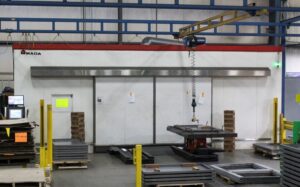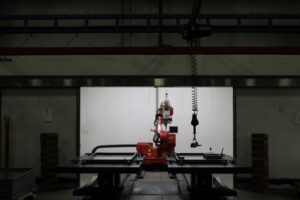Welding
Amada
Amada FLW 3000 ENSIS M5 Version Fiber Laser Welding Cell, 2018 #695
Trumpf
4000-watt Trumpf Trulaser Weld Fiber Cell, 2018 #512
Industrial Welding
As part of your manufacturing or fabrication process, you may need to weld, which is a way of bonding pieces of metal together using heat. Welding can be an asset to manufacturing processes in which manufacturers have the potential to refine goods quickly and efficiently. During a process where welding fabrication is mandatory, selecting and investing in the appropriate level of technology is imperative to the accurate completion of your fabrication process.
What is Welding?
Welding is a manufacturing procedure that includes melting and fusing two or more thermoplastic or metal components together to form a single, solid object. This method has been used in many different fields and applications, including architecture, shipbuilding, aerospace, and the production of automobiles.
What Industries use Industrial Welding?
Due to its adaptability and capacity to securely combine metals and other materials, welding is a vital technique utilized in a variety of industries. Manufacturing, construction, automotive, aerospace, shipbuilding, oil and gas, energy and power generation, mining, railroad and transportation, defense and military, medical device manufacturing, electronics manufacturing, automotive manufacturing, and other key industries all rely heavily on welding.
Industrial welding is essential for a variety of reasons across different industries and applications. Some benefits include strength and durability, versatility, customization, cost-effectiveness, speed and efficiency, safety, and precision. Industrial welding plays a vital role in creating strong, reliable, and customized components and structures. It facilitates efficient production, maintenance, and repair processes while promoting safety and innovation.
What Machines Are Used in Industrial Welding?

Fiber Laser Welding Cell
There are many advantages to using an industrial welding machine in fabrication and production processes. These devices produce welds that are accurate and reliable, guaranteeing high-quality outcomes. By enabling quicker welding and decreasing downtime, they increase efficiency and productivity. Industrial welding machines are adaptable to a variety of materials and joint configurations, and automation options minimize human expenses and mistakes. These machines promote safety, preserve resources, and provide customization choices, making them indispensable instruments for production that is low-cost, dependable, and quality-focused across a variety of industries.
The appropriate type of industrial welder technology largely depends on the desired outcome of ready-to-be further processed or finished material. There are welding operations that may call for metal inert gas (MIG) welding or tungsten inert gas (TIG) welding, which may require direct machine usage. While there are many types of direct welding machines, some common types of automated and robotic welders are fiber laser welders, laser welder machines, and arc welding machines. Leveraging robots and automated technology, this machinery aims to increase precision and productivity to help save you time and money.
Advantages of Using Industrial Welding Machines

Welding Cell Tables and Robot
Automated welding machines can be a great asset when looking to increase productivity and the flow of welding operations. Robotic or automated welding machines may also help increase precision due to programming, leading to a high-impact solution for your production processes. Our experienced and knowledgeable team here at Elite Machinery is ready to help you find the welding machine that you are looking for.
Ready to see how Elite Machinery can help you find your solution? Contact us today. Already know what industrial welder you’re looking for? Request a quote now!

